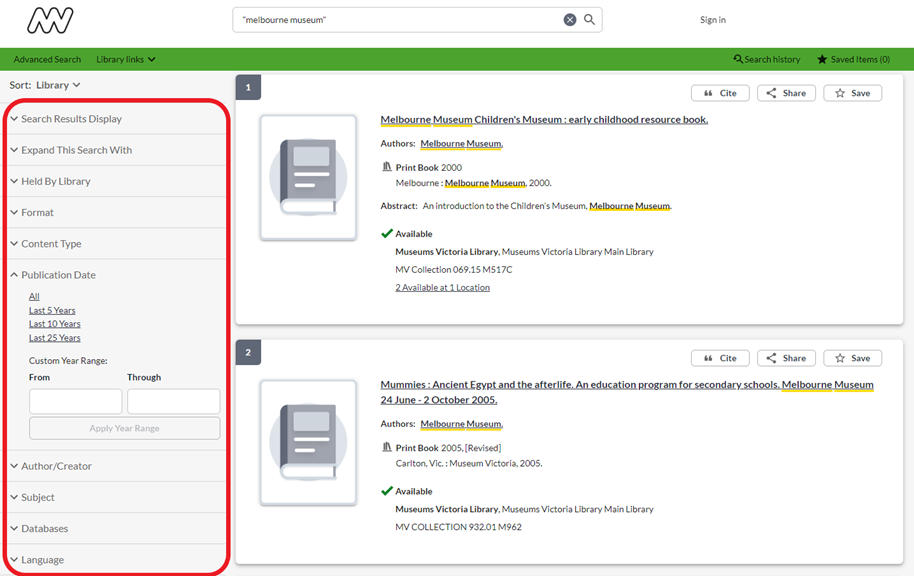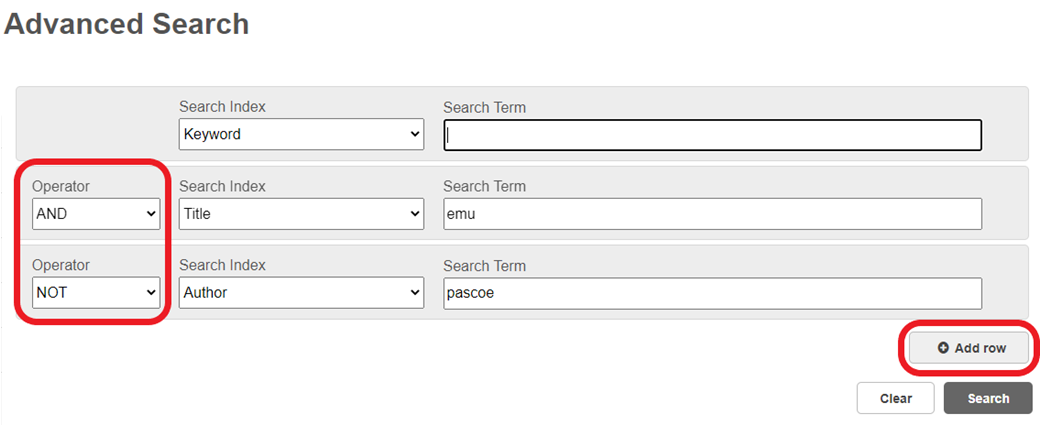Search the library catalogue
The Museums Victoria Library catalogue includes records for our physical collection items as well as subscribed electronic resources and open access electronic books and journals.
Please see our library webpage for information on how to access the collection.
The following instructions explain the basics of searching. There are also instructions on how to apply complex search commands to increase the relevancy of your results.
If you need assistance, please get in touch with us via Ask Us.
Getting Started
Using the basic search functionality, you can search our library catalogue with a single word, multiple words, or a phrase.
A phrase can be searched for by using double quotes, for example: “blue bottle”. The names of people, organisations and multi-word places are best searched for using double quotes, for example: “Royal Exhibition Building”, “Carl Linnaeus” and “Ascot Vale”.
This basic search will search across all fields and therefore may produce a lot of results.
If you find that this basic search is producing too many results, you can further refine your search results using the filters on the left-hand dropdown menus on the search results page.
Using these filters, you can narrow search results by format; content type; date; author; subject; language; and audience.
Boolean Search
You can also use the Boolean operators AND/OR/NOT to build complex searches.
AND finds all terms anywhere in a record; OR finds any single term or all terms; and NOT excludes the term that follows not.
Examples of Boolean searches include:
Pascoe AND emu
Tractor NOT model
Gold OR silver
The advanced search functionality can also be used to apply Boolean operators.
In advanced search, you can combine up to five indexes and apply limits to retrieve a more precise set of search results.
Truncation & Wildcards
Truncation uses the asterisk (*) symbol added to the end of a word to retrieve variant endings.
For example, a search for “connect*” would retrieve results with connect, connection, connectivity etc.
Wildcards use the hash (#) or question mark (?) symbol to replace unknown characters in a search term. The # wildcard replaces one character in a search, and the ? wildcard replaces up to nine characters in a search.
For example, a search for “wom#n” will retrieve results for woman, women, and womyn, while a search for “pal?ontology” would retrieve results with paleontology and palaeontology.
Proximity Operators
A phrase search using quotation marks (“”) will allow you to find words that sit next to each other in records.
For example, if you search for “aluminium wiring” you will only retrieve results where the words aluminium and wiring sit next to each other, in this order, in a record.
Using the proximity operator “near” (or n) will find words that are close to each other in records.
For example, a search for “moon n eclipse” will retrieve results where both words sit in close proximity to one another in a record, in any order.
You can also specify the maximum number of words that can appear in between by adding a number after the operator.
For example, a search for “moon n3 eclipse” will find records where these two words sit with no more than three words in between, in any order.
Building Complex Searches
There are a number of search indexes that you can query using shortcuts as a prefix to your search term:
au: = author
pb: = publisher
bq: = barcode
pl: = publisher location
co: = corporate name/conference name
pn: = personal name
dd: = dewey decimal number
su: = subject
io: = action note
ti: = title
kw: = keyword
yr: = year
nu: = call number
For example, a search for “ti:museum” will find records with the word ‘museum’ in the title.
It is also possible to limit a search to include only Internet resources or exclude records for internet resources using the term “mt:url” or “NOT mt:url”
All of the functionality detailed above can be combined to build complex searches.
For example, to look for books about women that have been published in Melbourne from 1990 to the present day, search for:
“su:wom?n AND pl:Melbourne AND yr:1990-”


